|
|
|
Sort Order |
|
|
|
Items / Page
|
|
|
|
|
|
|
| Srl | Item |
| 1 |
ID:
090667
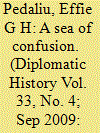

|
|
|
|
|
| Publication |
2009.
|
| Summary/Abstract |
From the beginning of the Cold War, the Mediterranean had emerged as one of the key theaters of confrontation between the United States and the USSR. However, the Cold War was to be just one of the many factors that fed this precarious regional security environment. As British power in the Mediterranean began to contract after 1945, the United States initially reluctantly, but inevitably, moved to fill this power vacuum through the Truman Doctrine, the inclusion into the North Atlantic Treaty Organization (NATO) of initially, France and Italy and later Greece and Turkey and the cultivation of an understanding with General Franco. Attempts were made to create closer relations with moderate Arab regimes through the Eisenhower Doctrine. During the 1950s, the Mediterranean became a sea of American preponderance where, ostensibly, most local sources of discord had been subsumed into the greater global conflict.
|
|
|
|
|
|
|
|
|
|
|
|
|
|
|
|
| 2 |
ID:
090660
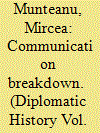

|
|
|
|
|
| Publication |
2009.
|
| Summary/Abstract |
During the August 2, 1969, discussion between Nixon and Ceausescu in Bucharest, the U.S. president's interest in gauging the exact latitude the Romanians had was apparent. Several times Nixon reiterated U.S. interest in maintaining Romania's independent position within the Soviet bloc and voiced concern that the close U.S.-Romanian relations could cause Moscow to place undue pressure on Bucharest. Ceausescu and Prime Minister Ion Gheorghe Maurer, however, dismissed Nixon's concern, confident that they would be able to continue the balancing act between signaling their differences with Moscow and stressing their similarities.
|
|
|
|
|
|
|
|
|
|
|
|
|
|
|
|
| 3 |
ID:
090662
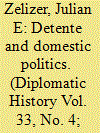

|
|
|
|
|
| Publication |
2009.
|
| Summary/Abstract |
During the first half of the 1970s, Presidents Richard Nixon and Gerald Ford responded to the aftermath of Vietnam by avoiding the extremes of the era: massive military retrenchment (left) and massive military escalation (right). The presidents had different reasons for seeking a centrist national security agenda. The Republican presidents were willing to accept and actively pursue arms and trade agreements with the Soviet Union and China. Nixon concluded that appealing to moderates was essential in order to protect a muscular national security state from retrenchment in the aftermath of the 1960s and to ensure his own electoral success. His successor, Gerald Ford, believed that détente with the Soviets could rebuild public confidence in the post-Watergate GOP.
|
|
|
|
|
|
|
|
|
|
|
|
|
|
|
|
| 4 |
ID:
090665
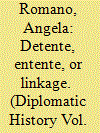

|
|
|
|
|
| Publication |
2009.
|
| Summary/Abstract |
A significant relaxation of tensions between East and West occurred after the mid-sixties. Between 1963 and 1968 an increasing dialogue between the superpowers started to develop. Its genesis was in the Soviet achievement, in 1964-65, of the second-strike capability on nuclear weapons, which meant the possibility of mutual assured destruction (MAD) in case of war. The imminent strategic parity between the superpowers created the balance of terror-deterrence-and engendered the political will to pursue limitation to the nuclear armaments race and to define rules to manage the nuclear arsenal. In October 1966, duringa speech in New York, U.S. President Lyndon B. Johnson invited the Soviet Union to resume the détente process by agreeing on military troop reductions on both sides in order to create an increasing reconciliation in Europe.2 Two years later, on July 1, 1968, the Nonproliferation Treaty was signed and created the basis for managing the world nuclear arsenal.
|
|
|
|
|
|
|
|
|
|
|
|
|
|
|
|
| 5 |
ID:
090658


|
|
|
|
|
| Publication |
2009.
|
| Summary/Abstract |
Brzezinski preferred to divide Sino-American relations into three parts-bilateral relations, common strategic interests focused on the Soviet threat, and normalization-and he wanted to pursue each on a separate track. He agreed with Vance that progress towards normalization would require a compromise on the future status of Taiwan, but he argued that the Chinese might be less strident on the issue if they became convinced that closer relations with the United States would enhance their own security vis-à-vis the Soviets. In any event, Brzezinski believed that the Chinese were sufficiently concerned about the Soviet threat, that they were interested in ways that the United States might be used to offset that threat, that mutually beneficial relations in some areas could progress ahead of the normalization process if necessary. In that context, he was eager to demonstrate progress in Sino-American relations in part as a signal to the Soviets to help them understand the value of "restraint and reciprocity
|
|
|
|
|
|
|
|
|
|
|
|
|
|
|
|
| 6 |
ID:
090661
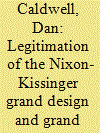

|
|
|
|
|
| Publication |
2009.
|
| Summary/Abstract |
This article focuses on the attempt of President Richard M. Nixon and Dr. Kissinger to gain domestic acceptance of the grand design and grand strategy they developed for American foreign policy during the period they were in office, with particular emphasis on the concept of policy legitimation. This article draws on extensive secondary accounts, memoirs, archival materials, and the author's interviews and own previously published, related work.
|
|
|
|
|
|
|
|
|
|
|
|
|
|
|
|
| 7 |
ID:
090659
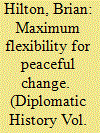

|
|
|
|
|
| Publication |
2009.
|
| Summary/Abstract |
The first part of this article will discuss the prepresidential origins of Carter's global worldview and how this shaped the administration's dealings with the Soviet Union and the PRC. The second part will focus on the reasons Carter was unwilling to allow continued recognition of the ROC. Ultimately, Carter's moralistic sensibilities and his desire to create a more stable world order formed the basis by which he decided to normalize relations with the PRC and to accept the political consequences of "abandoning" Taiwan.
|
|
|
|
|
|
|
|
|
|
|
|
|
|
|
|
| 8 |
ID:
090664


|
|
|
|
|
| Publication |
2009.
|
| Summary/Abstract |
This article focuses primarily on the nuclear relationship between the two countries with specific emphasis placed on the U.S.-Soviet Agreement on the Prevention of Nuclear War, signed in Washington between President Richard Nixon and General Secretary Leonid Brezhnev on June 22, 1973. Known by the British as "Operation Hullabaloo," and conducted in great secrecy, Britain's involvement was significantly greater than acknowledged at the time. Far from being bit players lurking in the wings of the Cold War, British officials were integral to the negotiations and largely responsible for drafting the treaty. But the dictates imposed in maintaining an exclusive bilateral relationship with Washington were often at variance with the need to develop a European security identity.
|
|
|
|
|
|
|
|
|
|
|
|
|
|
|
|
| 9 |
ID:
090666


|
|
|
|
|
| Publication |
2009.
|
| Summary/Abstract |
During the détente years, U.S.-Soviet cultural relations were conducted against the background of the Soviet state's harsh treatment of nonconformist writers. Since the publication abroad of Doctor Zhivago and the awarding of the 1958 Noble Prize to Boris Pasternak, the fate of Soviet writers and their works provided a reliable means of monitoring the political atmosphere of this secretive state. There was a growing record of indefensible transgressions by the USSR, even if such information was not often acted upon at the highest levels of the American government
|
|
|
|
|
|
|
|
|
|
|
|
|
|
|
|
| 10 |
ID:
090657
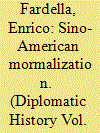

|
|
|
|
|
| Publication |
2009.
|
| Summary/Abstract |
The diplomatic normalization between the United States and the PRC may certainly by considered one of the most important events in the development of the Cold War in Asia as well as in the world. Its historical meaning transcends the simple diplomatic recognition between two countries: it war a crucial tactical element in a much wider strategic plan outlined by the convergence of Beijing's and Washington's national interests in the second half of the 1970s.
|
|
|
|
|
|
|
|
|
|
|
|
|
|
|
|
| 11 |
ID:
090663


|
|
|
|
|
| Publication |
2009.
|
| Summary/Abstract |
This brings us to the second major aspect of Nixon and Kissinger's foreign policy: recognition of the sovereignty of the East European communist states and encouragement of greater independence on their part in foreign and domestic policy. Both the Nixon and Ford administrations rejected the Brezhnev Doctrine of limited sovereignty, pronounced by Moscow in the wake of the Soviet invasion of Czechoslovakia in 1968-namely, that the Soviet Union and its allies had the right to intervene, even militarily, if they believed that the survival of communism in a "fraternal" state was under threat. Both administrations also sought to encourage the communist regimes of Eastern Europe-rather than the people living under them-to pursue more independent policies vis-à-vis Moscow. Basically, the Nixon and Ford administrations believed in working through the existing communist regimes in Eastern Europe in the hope of promoting change over the long term. This put Nixon, Kissinger, and Ford in the position of recognizing and even promoting the sovereignty of the East European communist regimes.
|
|
|
|
|
|
|
|
|
|
|
|
|
|
|
|
|
|
|
|
|